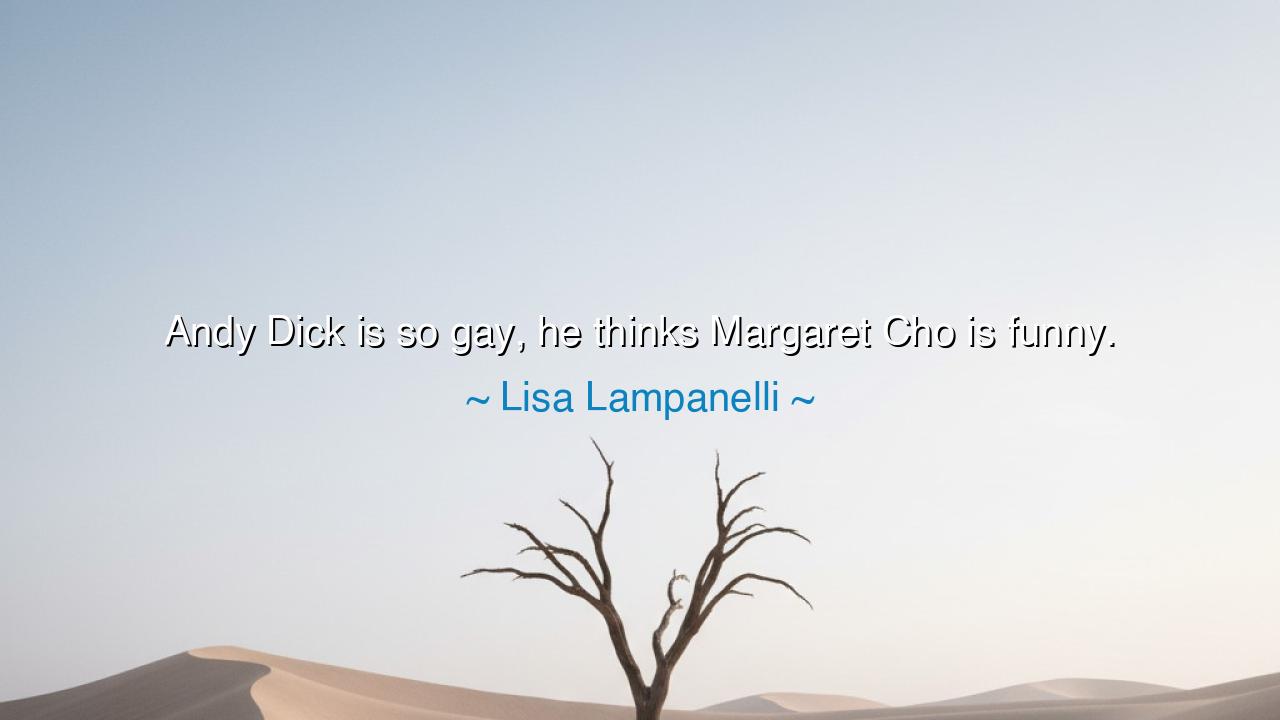
Andy Dick is so gay, he thinks Margaret Cho is funny.






When Lisa Lampanelli proclaimed, “Andy Dick is so gay, he thinks Margaret Cho is funny,” she spoke in the tongue of jesters — bold, biting, and fearless — yet beneath her laughter lies the ancient wisdom of satire itself. Her words, though born in the world of modern stand-up, descend from a long lineage of comedians who used exaggeration and mockery not to wound, but to reveal truth through laughter. The statement, on its surface, is outrageous; yet its essence is simple: that humor thrives in the freedom to offend, in the shared understanding that laughter is the bridge between pain and joy, between identity and expression.
The origin of this quote rests in the comedic arena where Lampanelli reigned as the “Queen of Mean.” Her humor, like that of the court jesters of old, was a weapon forged in irony — a tool to strip away pretense and expose hypocrisy. To call Andy Dick “so gay” or to invoke Margaret Cho as a measure of comic taste is not to insult, but to celebrate absurdity, to wield exaggeration as a mirror. Lampanelli’s comedy, much like the plays of Aristophanes, thrives on paradox: the insult becomes homage, the mockery becomes acceptance. Her humor challenges, provokes, and in so doing, demands that we confront the boundaries of our comfort and the definitions of identity itself.
The ancients knew this kind of laughter well. In the festivals of Dionysus, actors mocked kings, priests, and philosophers without fear. Through ridicule, they revealed the divine comedy of human arrogance. The gods themselves were not spared from laughter, for to laugh at something is to recognize it as part of ourselves. So too, Lampanelli’s jest about sexuality and comedy is not meant to divide, but to unite through shared discomfort. For laughter, when born of awareness, levels all things — it humbles the proud and uplifts the scorned. It is a reminder that identity, when it becomes too serious, loses its power to liberate.
There is, too, a deeper irony in Lampanelli’s words. Both Andy Dick and Margaret Cho are comedians known for their defiance of convention — one chaotic, the other outspoken; both existing outside the boundaries of what polite society deems acceptable. To say that Andy Dick “thinks Margaret Cho is funny” is to suggest a kinship between outcasts, a recognition that humor belongs to those who have suffered, who have been misunderstood, and who have turned pain into performance. Lampanelli, in her way, honors them both by roasting them — for in the realm of comedy, to be roasted is to be included, to be seen as part of the great family of jesters who make the world bearable.
In this light, Lampanelli’s humor becomes more than vulgarity; it becomes ritual honesty. She reminds us that comedy’s sacred duty is to trespass, to enter forbidden places of speech and thought, and to emerge laughing. The wise of every age have known that to suppress laughter is to stifle truth. The philosopher Voltaire once said that to learn who rules you, simply find out who you cannot joke about. Lampanelli’s joke, outrageous as it seems, breaks that very rule — and thus reclaims the power of humor from the grip of fear.
Yet her jest carries a lesson as well: that intention sanctifies the laugh. The laughter that wounds is cruelty; the laughter that enlightens is grace. Lampanelli’s words, though harsh in sound, spring from inclusion, from a world where everyone — gay, straight, saint, or sinner — is fair game, because everyone is equal in absurdity. The power of her joke lies in her fearlessness, her refusal to bow before the fragile egos of the self-righteous. And in that, she teaches that to laugh with courage is to live freely — to speak truth with mirth and to embrace the chaos of being human.
So, dear listener, let this be your lesson: do not fear the laughter that unsettles. The funny thing about offense is that it is often the first step toward understanding. When humor is wielded with awareness, it does not destroy — it awakens. Seek laughter that exposes, not laughter that hides. Laugh at yourself before you laugh at others, and see in every jest the shadow of truth. For comedy, as Lampanelli shows us, is the philosopher’s torch disguised as a fool’s grin. It lights the darkest corners of the soul and reminds us that even in mockery, there is love — and that in laughter, all divisions fade.
Thus, the teaching of Lisa Lampanelli endures: that to speak the unspeakable with wit is to free it from fear. Her words, though wrapped in jest, remind us that laughter is not the enemy of truth, but its oldest and most loyal friend.






AAdministratorAdministrator
Welcome, honored guests. Please leave a comment, we will respond soon